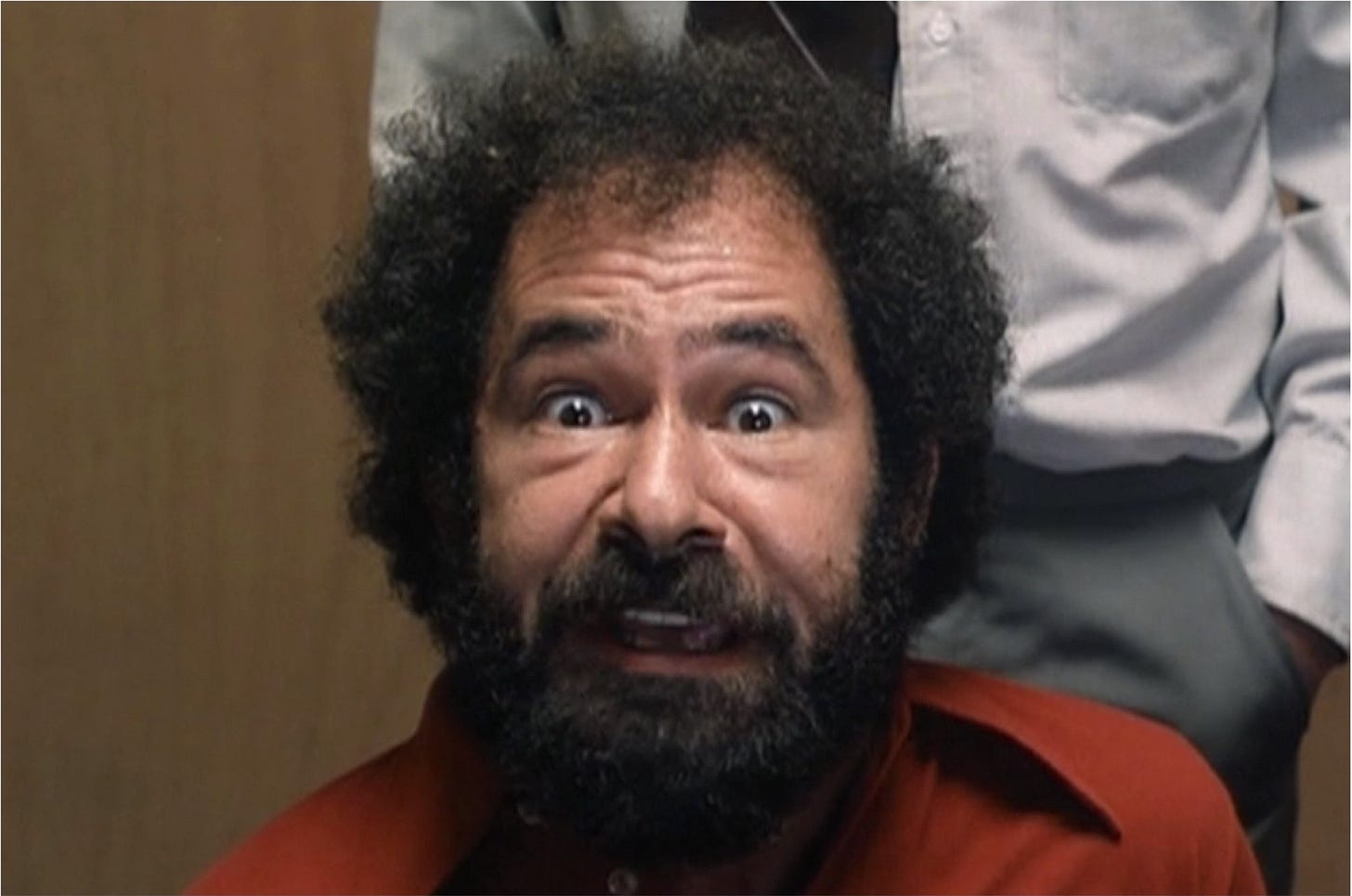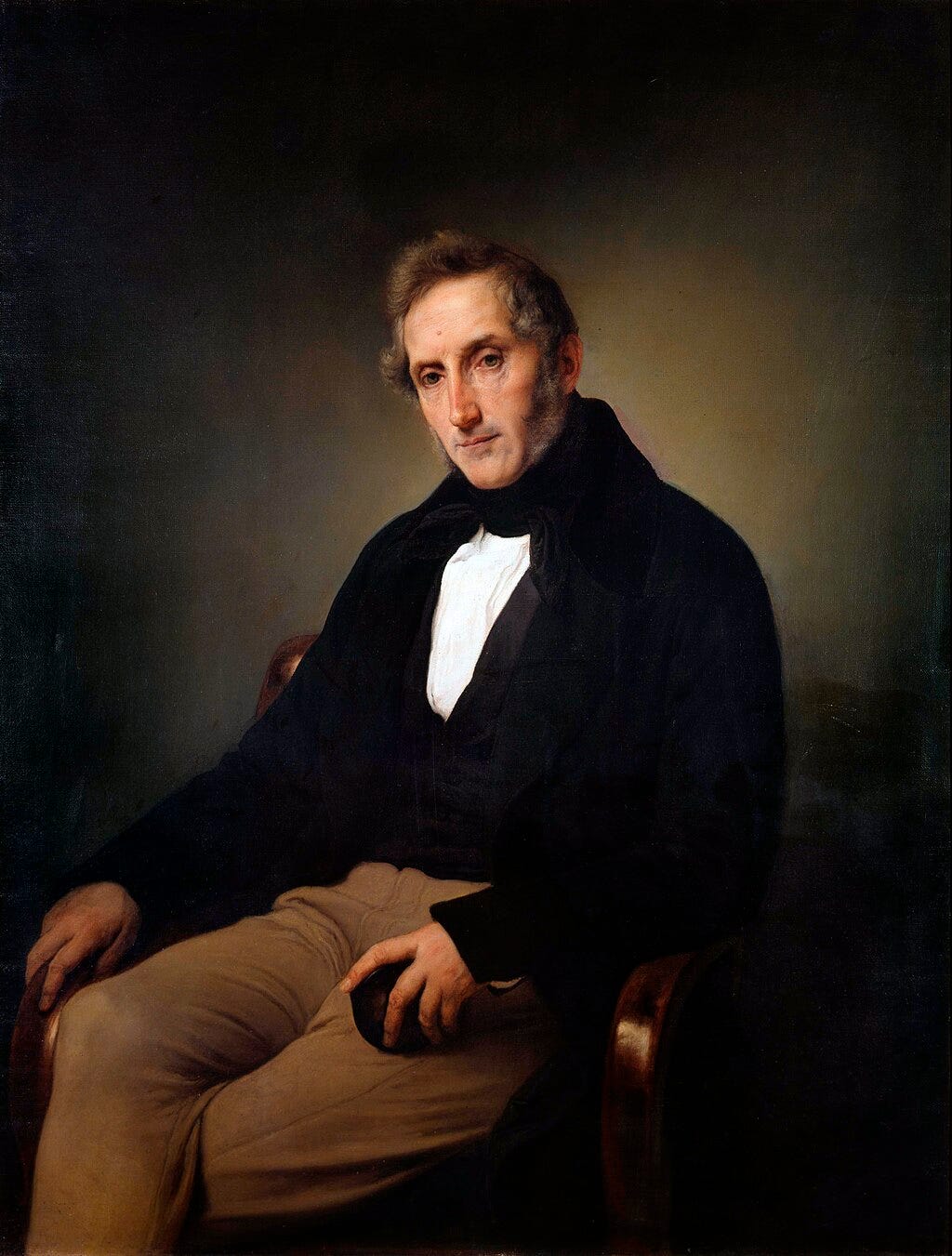The Human Comedy of ‘The Betrothed’
Reviewing Alessandro Manzoni’s Beloved Italian Classic
Somewhere I heard someone say Alessandro Manzoni’s The Betrothed is to Italian literature what Shakespeare is to English. Such statements will either make your eyes roll or your index finger click “add to cart.” You can guess what I did.
The timing coincided with the release of a new English translation by Michael F. Moore in 2022—widely reviewed, eagerly discussed. But the timing was lousy, at least for me.
I waited before reading because I was wrapping up writing and editing my own book (out this November!) and had to be judicious in my extracurricular reading. Set in seventeenth-century Lombardy, The Betrothed is dense, layered, and complex; I didn’t think I had time to get over the cultural learning curve, let alone tackle the length (about 650 pages).
But then I submitted my manuscript and dove in. Within a couple of pages, I knew I was in the hands of a comic genius.
The opening? A cowardly priest, Don Abbondio, is threatened by two thugs sent by a nefarious local nobleman. They warn him not to marry the two young protagonists, Renzo and Lucia, or else. Scared half to death, Don Abbondio agrees to thwart the lovers’ plans to save his own skin.
Renzo and Lucia’s ensuing attempt to force Don Abbondio into marrying them is both desperate and hilarious. Can you really trap a priest in his bedroom and force him to recognize you as man and wife? And how many people will go along with such a ruse?
Manzoni wastes no time establishing his perspective and tone: the world is dangerous, the stakes are high, but people are hopelessly silly and morally absurd. Cancel all my meetings.
Old Is New
Manzoni began writing the book in the 1820s, a period in which Europe was tossed by revolutions and upheavals of all sorts—political, social, martial, intellectual. He himself endured personal upheaval several years before; a crisis of the soul led him to abandon his fashionable agnosticism and re-embrace the Catholicism of his youth.
While Manzoni set his story two centuries prior, it’s full of the same sorts of turmoil he and his contemporaries had endured and would endure: war, plague, economic chaos, and more. Despite the temporal distance, his original readers would have felt right at home. Remarkably, so do we.
Some of that resonance no doubt comes from Moore’s highly praised translation. I don’t know how the original Italian feels, but the English zings and crackles like pitch-perfect modern prose. But that’s not the only aspect of the story that feels curiously contemporary.
The Betrothed is a novel about the brave, the cowardly, the malicious, the virtuous, the diligent, the idle, the nosy, the repentant—all trying to live and love in a world shaped by violence, injustice, financial woes, disease, bureaucratic idiocy, and political strife.
Sound familiar? It’s not exactly my X feed, but it’s close. Whether cast against the backdrop of COVID or recent international trade disputes, we can see our own times ricocheting off the twists and turns of the narrative.
And somehow, Manzoni folds his extensive and insightful social commentary into sensitive explorations of the interior lives of his many characters—the majority of whom feel fully realized. Consider the Nameless One, a monstrous villain so dangerous and vile that local authorities won’t even bother him.
Turnabout
When Don Rodrigo, the meddling nobleman who wants to prevent Renzo and Lucia from marrying, enlists the Nameless One to kidnap Lucia so he can have her for his own, the Nameless One agrees. But then something astonishing happens: Lucia’s pure-hearted devotion to God explodes his defenses. His conscience revolts.
Amazingly, the Nameless One repents—not in the flat, phony way novelists often depict religious conversion. While completely unexpected, it still feels utterly believable. His change of heart could cost him almost everything, and yet he navigates the fallout as you might imagine someone sincerely transformed actually would. As the narrative returns to the Nameless One later on, he remains steadfast in his new convictions.
Repentance provides The Betrothed both thematic depth and moral heft. Later, Renzo contemplates murdering Don Rodrigo for spoiling his marriage with Lucia. He has every reason: Rodrigo has kidnapped and terrorized his betrothed, driven him into exile, ruined his life.
But a friend—a monk named Fra Cristoforo, whose own backstory includes taking a life—confronts Renzo. Not only would such reprisal be evil in itself, he says, but Renzo might rob Rodrigo of a chance for salvation. Rodrigo is dying of the plague.
“It may be punishment,” says Cristoforo,
or it may be mercy. What you feel now for this man who offended you is the same feeling that God—whom you, too, have offended—will have for you on the day of judgment. Bless him, and you shall be blessed. . . . Perhaps God is ready to grant him his hour of absolution, but He wanted to hear you pray for it. Perhaps He wants both you and that innocent girl to pray for it. Or perhaps He is withholding grace until He hears your prayer, the prayer of a heart that is afflicted and resigned. Perhaps both this man’s salvation and your own depend on your capacity for forgiveness, for compassion . . . for love!
There’s no room for retribution when repentance is still possible.
It’s one of the most compelling reversals in the book. The Nameless One repents. Rodrigo still might. But the real question: Will Renzo, their moral superior, repent of his murderous intent? Anyone can turn, Manzoni convincingly shows us, and sometimes the “better” person is actually closer to spiritual blindness than his moral inferiors.
Against All Odds
While Manzoni offers up plenty of punditry (he disapproves of price controls, reasonably enough), he’s mostly concerned with the fates of his characters. And he puts them through the wringer.
Just when you think the situation can’t get worse, it does. There is, for instance, a moment when Lucia makes a vow of chastity, believing she can never marry Renzo. Even if the couple manages to reunite despite the forces arrayed against them, it’s impossible to imagine how they can be wed now. Manzoni lets you sit in the narrative discomfort of that puzzler for quite a while.
And always he’s there with comic relief. Don Abbondio never fails to produce a laugh. If you recall The Rockford Files, he’s the Angel Martin of the novel—cowardly, evasive, perpetually convinced the world is unfairly stacked against him.

As the villagers flee in advance of German mercenaries, Abbondio begs someone to loan him a horse or a donkey. They ignore him as they pass by. “How is it that no one wants to help me?” he says. “Don’t you realize that most of them are Lutherans, and they think that murdering a priest would be a good deed? Do you want to leave me here to be martyred?”
When his parishioners tell him at least he doesn’t have to look after a family, he exclaims: “Woe is me! What kind of people are these! Don’t they have hearts! Is there no charity left in the world! Everyone is thinking only about themselves, and no one thinking about me.”
Subscribe for More
If you enjoy what I’m doing here, subscribe for more joy! I usually publish a literary essay and a review every week—and it’s always free.
Even Manzoni’s minor characters shine. Don Rodrigo’s henchman Griso is so greedy to loot his master’s wardrobe that he catches the plague from the clothes and dies before the man he betrays.
Or take Donna Prassede, the meddlesome noblewoman who briefly cares for Lucia after the Nameless One releases her; it’s a tiny role but rendered so perfectly you can’t forget her. She possessed, says Manzoni,
a strong propensity for good deeds, certainly the worthiest profession a person can exercise, but which can unfortunately—like all the others—also make matters worse. To do good, you have to be able to recognize it, and as in anything, the only way we can recognize it is through our personal passions, judgments, and ideas, which are often limited. There is a saying that, when it comes to friends, you should have very few, but to those few be very close. Donna Prassede applied the same rule to ideas: including, unfortunately, many that were bad, which were not the ones she cherished the least.
Manzoni dramatizes the mystery of divine providence through this rowdy circus of flawed humans. They are the miracles. The earnest, the foolish, the faulty, the faithful—everyone moves to their own rhythms, and yet their actions converge toward redemptive ends.
Lucia’s mother, Agnese, refuses to give up hope. Fra Cristoforo serves plague victims until he succumbs himself. Yes, salvation comes from God, but he works through our fellow humans: goofy as they might be, goofy as we are.
Relevance Today
The events depicted in The Betrothed are four centuries old; Manzoni’s original draft is two centuries old. Why read it today? So many reasons, but start with this: It’s probably the most entertaining novel I’ve ever read. And somehow amid all the laughs, themes such as justice, mercy, repentance, and many others are handled deftly, realistically. I’m woefully under-read, but I can’t think of a contemporary novel that comes close.
No book is for everyone. But I can confidently say that Manzoni’s classic is for far more than those who’ve already read it. There is a world out there bursting with readers who would love to spend time in the world Manzoni conjured two hundred years ago in Italy.
Sound like you? Prepare to cancel all your meetings.
What counts as comic literature for you? Share some examples in the comments below. And please hit the ❤️ icon and share this review. Many thanks!




I read The Betrothed many years ago with a wonderful book club and am so glad I read it. I think there are quite a few similarities between Ivanhoe by Sir Walter Scott and The Betrothed, which were written about the same time. The Betrothed is much more fun to read, though.
As for humor in writing, one author whose humor is a surprise is Marilynne Robinson. A friend and I met to discuss Gilead at a local coffee shop. I imagined that we would get into deep and weighty discussions about this beautiful book, perhaps about Calvinism, but instead we reviewed so many comic moments that we almost got tossed out of the coffee shop for laughing so loud.
I’ve added this to my to read list, I was introduced to Italian comic writing when I discovered the Don Camillo novels in English in my public library- great education on the complexities of life in post WW2 Italy, this sounds both entertaining and informative.